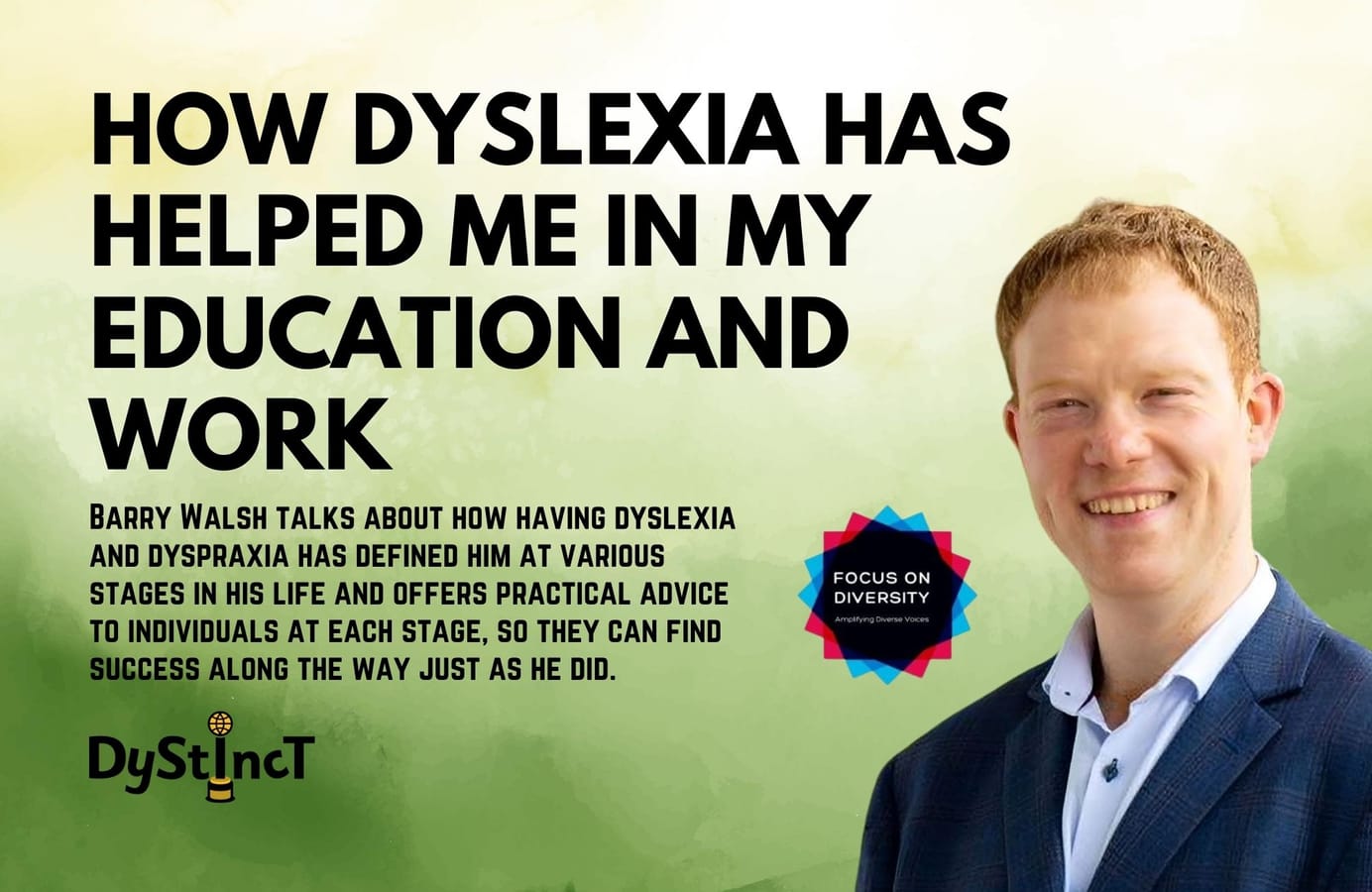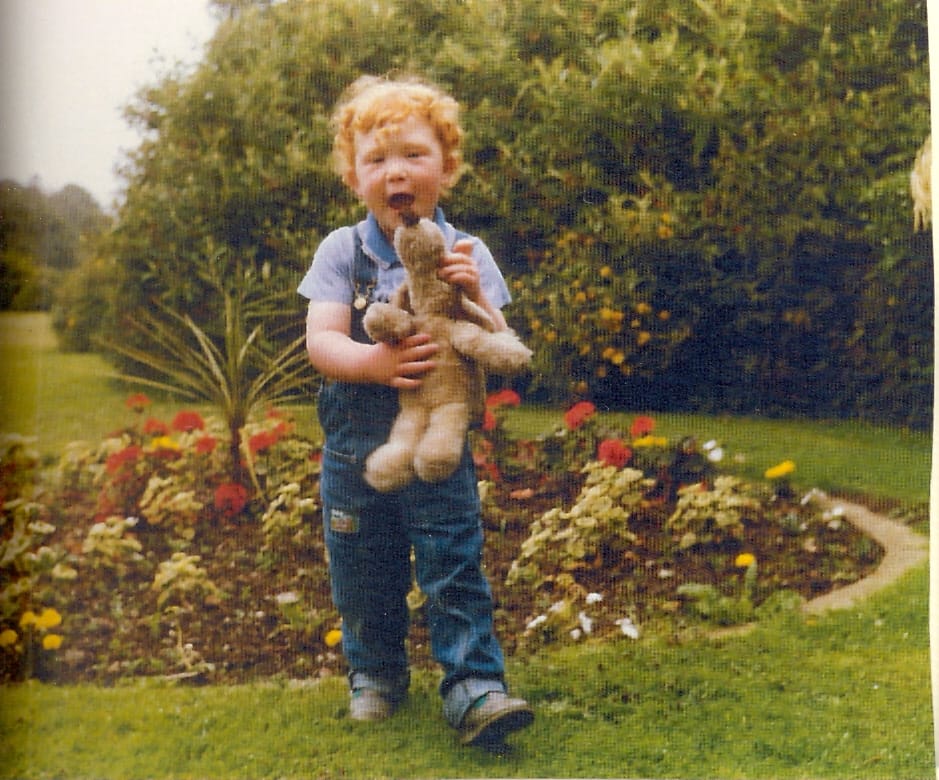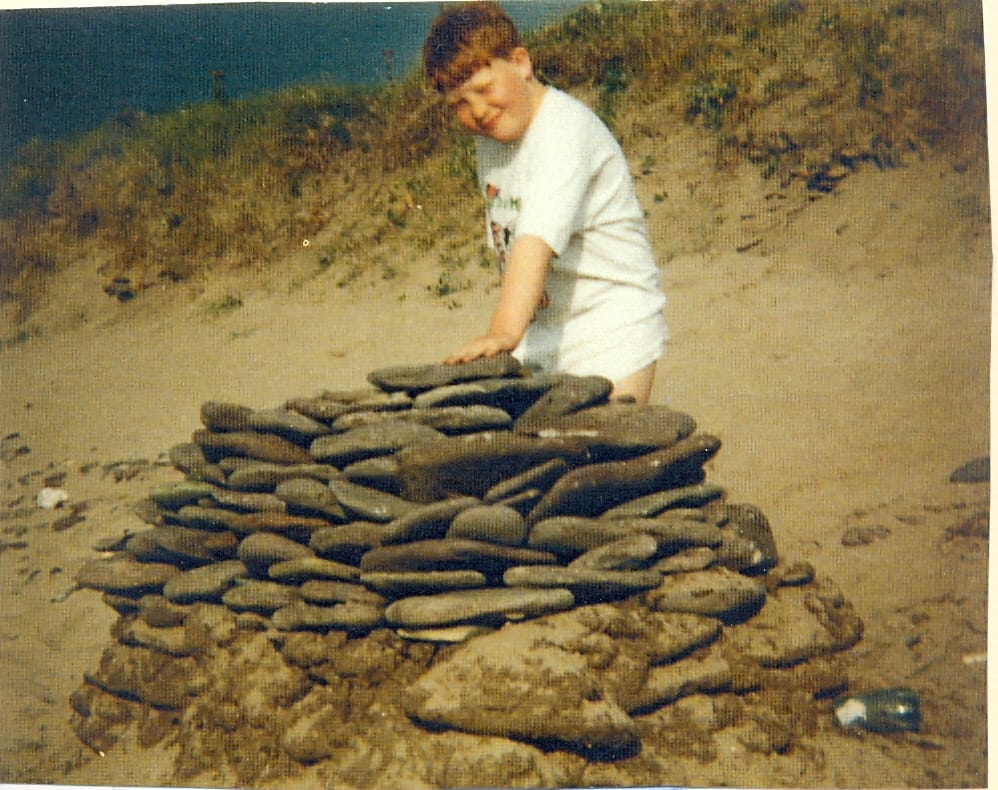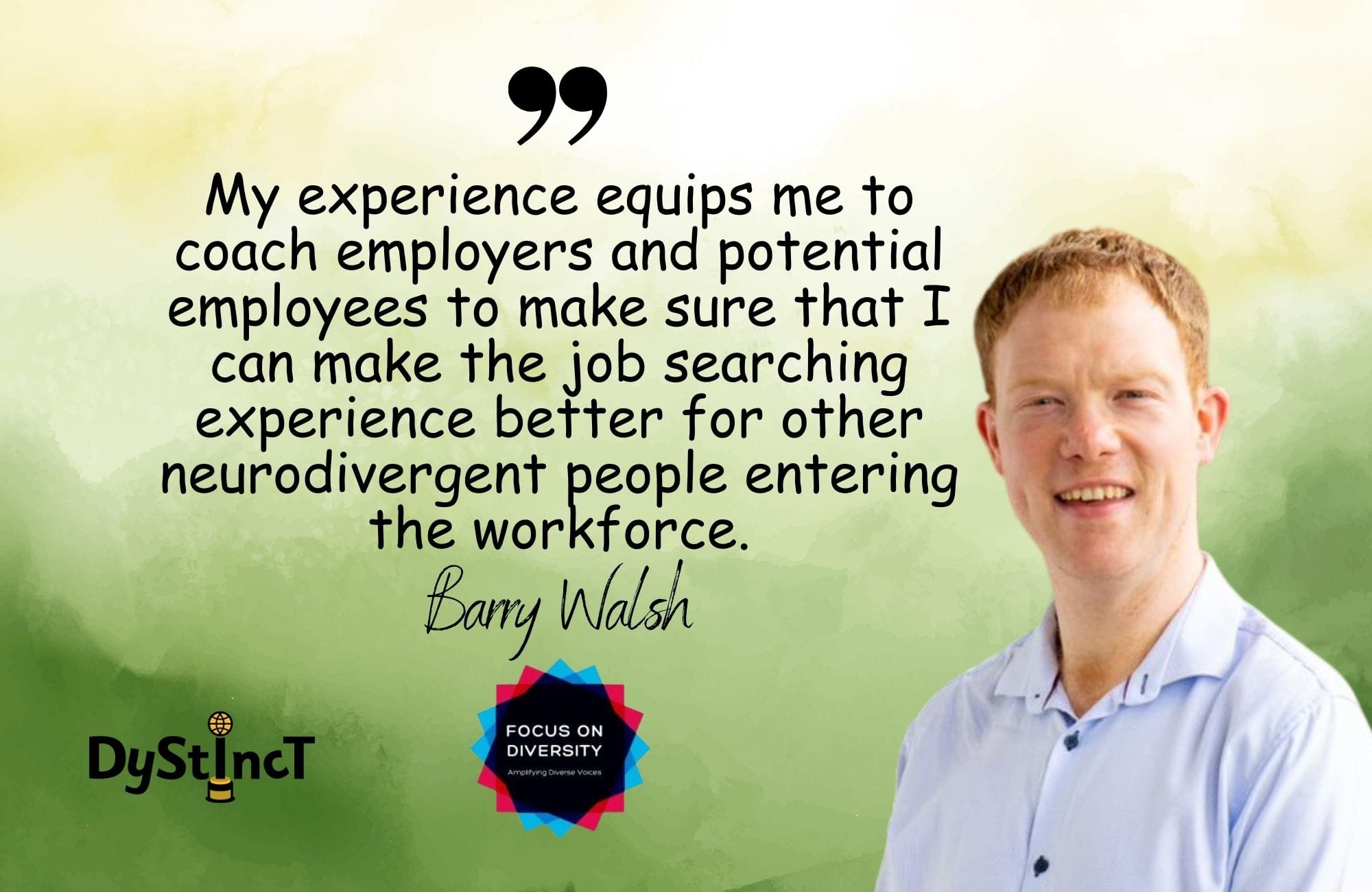
Issue 11: How Dyslexia has helped me in my Education and Work | Barry Walsh
Barry Walsh talks about how having dyslexia and dyspraxia has defined him at various stages in his life and offers practical advice to individuals at each stage, so they can find success along the way just as he did.
Table of Contents
Barry Walsh talks about how having dyslexia and dyspraxia has defined him at various stages in his life and offers practical advice to individuals at each stage, so they can find success along the way just as he did.
<Add Photo>
Having been diagnosed with dyslexia and dyspraxia at an early age, I went through all of school with supports in place. I qualified from college with a degree in marketing and a master's in advertising. I then began my career in advertising before moving to the charity sector and recruitment public sectors in Ireland. In 2016, I began working for ThinkBusiness.ie, which has everything you need to start, run or grow a business in Ireland, and I have been freelancing for them ever since. I specialise in doing case studies on diversity and inclusion in companies that operate in Ireland, particularly in neurodiversity. I have assisted in creating Dell Technologies' Neurodiversity Awareness Training and work as a job coach for autistic people in social enterprises.
Dyslexia is estimated to affect approximately 15% of the population. The exact figures for unemployment or underemployment (people who are highly qualified but not working in their preferred area) are estimated to be somewhere between 75-85%- This is described as the 'double empathy problem'. There's a lot of fear and trepidation on both sides. Employers may be nervous about employing someone that requires accommodations, and dyslexic employees may be nervous about disclosing their condition for fear of being discriminated against due to the employer's lack of awareness and having an outdated stereotype of the condition. However, if you're open about your condition, it can lead to several benefits in work and education.
How dyslexia helped me in my education and work
How dyslexia helped me in my education and work
Learning Support
Since the age of 10, I have been entitled to learning support. I would not be where I am today without it. It gave me the confidence to go forward. It prepared me to take charge of personal skills like time management, organisation, and stress relief. Learning support staff advocated on my behalf and pulled me up when I needed it. I wish everyone had access to the resources I had.


School support
When I was in school, I did Home Economics for my Leaving Cert (state exams similar to A Levels or SATs in America). As part of testing for the final exam, I was required to write in a practical book, which would take me thrice as long as everyone else. The unfairness of this testing process led my teacher and learning support teacher to write a complaint to the Department of Education. In one of the most terrifying moments of my life, I was hauled into the principal's office, only for him to tell me that he 100% supported the teacher and me. I was then allowed to type instead of writing in the examination.
Knowing what you're good at
Another strength of being neurodiverse is knowing what you're good at and what you're terrible at. I was always terrible at English and Maths, so I specifically chose college courses that would avoid both as much as possible. This led me to go into marketing, advertising and advocating for underrepresented groups, which consecutively led me to my chosen career path.
Anxiety around tests and exams
Even with supportive parents, fellow pupils and (most) teachers, there's still so much anxiety and stress around tests and exams. In primary school, one of my teachers had to bribe me with one sweet for every correct answer to motivate me to do a test. I felt stupid because others were getting ahead of me. It wasn't until college that I found that I wasn't suited to exam-style education. I much preferred assignments, which is where I excelled in college.
Developing strategies
In saying that I excelled in assignments, there were times when I had to come up with ways around my dyslexia to get ahead. At college, I chose to do courses more focused on assignments rather than exams. Often the assignments from different lecturers would all come at once. As a result, I had to develop organisational and time-management skills to complete all my assignments well ahead of time in order to meet my submission deadline. Being dyslexic, not only did I have to get my assignments done on time, but I had to get them done with 2-3 days to spare so that my mum and/or my learning support teachers could correct any errors before I turned them in.
Writing
At college, I was the guy that would write 5,000 words for a 2,000-word assignment. My lecturers sometimes refused to correct my assignments until I met the word limit allocation. So, I began getting everything on the page and then cutting it back. This process made me ten times better at writing because I learned to be more concise.
Information Processing
One of my main challenges is information processing. Often, I misunderstand what people say or the way they say it. It can be as simple as someone giving me directions or as complicated as learning to drive. Some of the information just won't be retained. So, I've had to develop strategies to work around this. I would create a task manager on my first day in every job I've ever had. I put in every task I had, big or small so that I wouldn't forget it. Then I'd colour code the spreadsheet in red, orange, or green, depending on how far along the task I would be. If the task wasn't going anywhere, it would be red, if it was currently being completed, it would be orange, and if the task was completed, it would be green. The spreadsheet always informed my workload for the coming weeks.
Presentations
While I was in the 1st year of my degree, I began to do presentations. I had never done them before, and I hated them. My dyslexia would get in the way. I had an ineffective way of presenting; I would start off reading my notes, look at the laptop, look back at the big screen, and then look back at my notes. I'd end up completely losing my train of thought, stumbling over words, and stopping before I found my place again. I very nearly gave up college due to these presentations. But I'm too competitive, so I decided to get rid of the notes and as much text as possible on the screen and memorise the presentation from start to finish. Doing this drastically improved my presentation skills to the extent that when it was announced that we couldn't use any notes on the important final presentation of my master's course, I didn't panic like the others because it was just another presentation to me.
Credibility
Having been an Employment Support Officer in the past, when I come across complex cases or people who feel there's no point in continuing due to their condition, I can advise them from my personal experience. Being dyslexic and having been passed over for positions due to my disability gives me more credibility than most to provide advice in this area.
Personal experience
Having gone through 135 interviews in 10 years, I've seen a lot. I've faced questions like, "Would your standard of English be good enough to work here?" and "Would your manager need to give you more support than a normal applicant?" I've also had my diagnosis disclosed to an employer without my permission. My experience equips me to coach employers and potential employees to make sure that I can make the job searching experience better for other neurodivergent people entering the workforce.
Connecting with like-minded people
One of the great things in recent years about dyslexia is people in business being more open about speaking about their neurodiversity. While writing articles that address this area, we now have an amazing community of like-minded people who all advocate for different types of neurodiversity so that we can promote what each other is doing in the area.
Developing Neurodiversity Awareness Training Program
When Dell Technologies was setting up a Neurodiversity Awareness Training Program, I was invited to a meeting in their offices with The Dyspraxia Association of Ireland. Later that year, I was invited to deliver a presentation on dyspraxia in the workplace to Dell's TrueAbility Employee Resource Groups. When it was time to launch the program, a position became available on their Diversity and Inclusion team. They suggested I apply, and I was successful. Without having dyslexia and dyspraxia, I wouldn't have been able to make those connections and be successful.
Presenting to Senior Management
After I joined Dell Technologies, I was doing one of my first Neurodiversity Awareness Trainings, where I assisted in training several of Dell's senior leadership team. At the end of the training, one of the most senior leaders asked me to stay behind. It turned out their son had just been diagnosed with dyslexia and dyspraxia. We had a 30-minute chat in a clear glass, soundproof office regarding my advice for his son when one of the directors walked in and said, "What the hell is he doing in there with them? I've wanted a meeting with them for two months!"
Paying it forward
I can now advocate for other neurodiverse groups of people with conditions such as autism, dyslexia, dyspraxia, ADHD, etc., so they can work effectively with employers. I coach employers on how to attract, interview, hire and support people with neurodiversity, so they don't have to go through what I went through to get to this place.
Barry Walsh
Neurodiversity advocate and Founder focusondiversity.ie | X.com/DiversityIre
Barry Walsh

In March 2021, I created my website focusondiversity.ie to amplify diverse voices in Ireland that are being proactive in the area of Diversity and Inclusion. I also provide tips or advice for neurodiversity people or their families. The website features over 100 companies. I've written articles on neurodiversity, tips for job hunting, writing a CV/Cover Letter, etc. I'm driven to continue reaching as many neurodiverse people as possible so that others don't have to go through what I went through to get a job where they can thrive.
Extracts from Dystinct Magazine
Extracts from Dystinct Magazine














